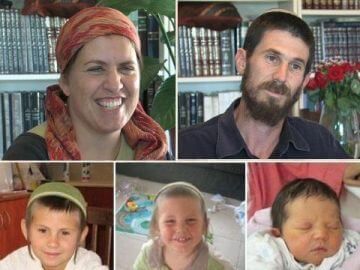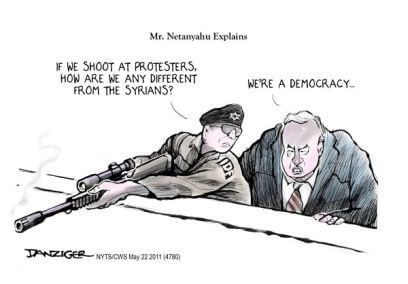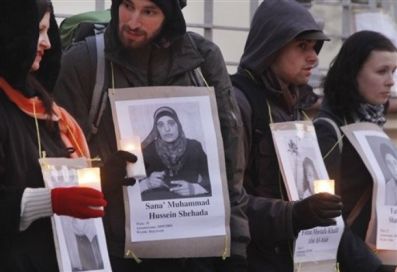It has been a year of big stories – Gilad Shalit, the Israel-Turkey meltdown, and the Palestinian statehood bid – all taking place against the backdrop of the Arab Spring and Iran’s atomic urgency.
We thank readers for all the Dishonest Reporter discussion on our web site, Facebook community and emails. The conversation gave us a lot to chew on, but the overall winner was clear. So without further ado . . .
![]() The 2011 Dishonest Reporting Award: The Guardian
The 2011 Dishonest Reporting Award: The Guardian
The biggest shock isn’t who won the award but the fact that The Guardian has never taken the accolade before. A steady stream of biased and sometimes downright viciously anti-Israel articles and opinion pieces culminated in Deborah Orr’s anti-Semitic take on the Gilad Shalit prisoner swap.
But Deborah Orr was not the only reason that The Guardian stood head and shoulders above other media outlets vying for this year’s Dishonest Reporter Award. From PaliLeaks, op-ed space for terrorists, its response to Judge Richard Goldstone’s mea culpa, and more — we had to write a separate Top 10 Reasons The Guardian Won.
Click on the image below to see why The Guardian won.
![]() Most Insensitive Response to Terror Award: Los Angeles Times
Most Insensitive Response to Terror Award: Los Angeles Times
The massacre of the Fogel family was easily the year’s most shocking outrage. Amjad Awad and his cousin, Hakim, broke into the Fogel’s Itamar home and methodically murdered everyone in the house. Room by room they went, slitting the throats of parents Udi and Ruth, sons Yoav (age 11) and Elad (three), and three-month-old daughter Hadas.

Unable to unconditionally condemn the horror, a Los Angeles Times staff editorial claimed that the slaughter was part of a “cycle of violence” equating settlements with the butchering of children:
One of the most depressing characteristics of the dysfunctional Palestinian-Israeli relationship is the self-destructive tit-for-tat mentality that often seems designed to keep the conflict alive rather than to end it.
Anyone who follows the news is familiar with how this cycle works . . .
Which is worse — stabbing children to death or building new houses in West Bank settlements? The answer is obvious. But that’s not the point. The point is that no’ matter how abhorrent the murders are, it serves no purpose to aggravate the provocation that led to them in the first place.
The term “cycle of violence” is just a handy buzzword for lazy, non-judgmental journalists. Everyone agrees that slitting throats of babies and children is heinous.
But the Times’ warped world view mitigates the horror because the family lived on the politically incorrect side of the Green Line.
![]() Eyes Wide Shut Award: BBC
Eyes Wide Shut Award: BBC

The BBC wasn’t sufficiently shocked by the Fogel massace to even bother reporting it for 24 hours. When British MP Louise Mensch (nee Bagshawe) publicly called the news service onto the carpet, her complaint came to the desk of Helen Boaden, the Beeb’s director of news.
Boaden conceded the BBC’s failure:
“I agree with you that the significant nature of this murder of an entire family meant it should have been included on our television news output.”
However, she denied that the BBC had ignored the story “either because we did not care or because we pursue an anti-Israel agenda”. She instead blamed “a remarkably busy weekend” because of the disaster in Japan, events in Libya and the spring meetings of the Liberal Democrats and the SNP which had to be covered “to ensure due political impartiality”.
![]()
Most Opportunistic Interviewer Award: Shahira Amin, Egypt’s Nile TV News
After five years as a Hamas captive, Gilad Shalit’s ordeal wasn’t quite over. Israelis were shocked to see veteran Egyptian reporter Shahira Amin interviewing a pale, gaunt and dazed Shalit.
Would he help campaign for the release of Palestinian prisoners, she asked. Did the experience make him stronger? Any thoughts on Egypt’s mediation? And — strangely — why didn’t the captive give more interviews? The latter question prompted a debate between Amin and Shalit’s Hamas handler whether to even continue the interview.
Amin was embarrassed enough to write an open letter to Israelis defending the interview, but it didn’t close the can of worms. Investigative journalist Richard Behar uncovered that Shalit had not even been checked by any Red Cross medics before being put in front of the rolling cameras and bright lights.
Behar also got a professional assessment of the interview with a reaction from Dr. Nancy Zarse, a veteran psychologist with expertise in FBI hostage negotiations:
There was evidence of increased autonomic [nervous system”] arousal, a lot of heavy breathing, and there were times that I thought he looked scared. This wasn’t really that you have the option to say no . . . I would understand that an individual like this still feels captive – that an interview like this would become part and parcel of the captivity.”
![]()
Dumbest Definition of Terror Award: Reuters
 On a blustery March afternoon, a bomb exploded at a busy Jerusalem bus stop. Mary Jean Gardner, a British national, was killed and 30 more were injured. How did Reuters describe the attack?
On a blustery March afternoon, a bomb exploded at a busy Jerusalem bus stop. Mary Jean Gardner, a British national, was killed and 30 more were injured. How did Reuters describe the attack?
Police said it was a “terrorist attack” — Israel’s term for a Palestinian strike.
Jeffrey Goldberg‘s snark was spot on:
Those Israelis and their crazy terms! I mean, referring to a fatal bombing of civilians as a “terrorist attack”? Who are they kidding? Everyone knows that a fatal bombing of Israeli civilians should be referred to as a “teachable moment.” Or as a “venting of certain frustrations.” Or as “an understandable reaction to Jewish perfidy.” Or perhaps as “a very special episode of ‘Cheers.’” Anything but “a terrorist attack.” I suppose Reuters will mark the 10th anniversary of 9/11 by referring to the attacks as “an exercise in urban renewal.”
Reuters has a particularly rich history of playing verbal gymnastics to avoid using the word “terror.” After the 9/11 attacks, Reuters news executive Stephen Jukes wrote in a memo:
“We all know that one man’s terrorist is another man’s freedom fighter and that Reuters upholds the principle that we do not use the word terrorist.”
The news service stood by this terror-free tradition in 2004 in a spat with CanWest, the Canadian newspaper chain that instructed its papers were instructed to substitute the word “terror” for words like “insurgents” and “rebels” in wire copy. Reuters reacted by asking CanWest to remove the Reuters bylines. CanWest responded:
But Mr. Schlesinger’s broader implication – that the substantive meaning of his reporters’ stories are being universally vitiated by our house style – is one we reject: As readers themselves know, there is no legitimate debate about whether Hamas or the al-Aqsa Martyr’s Brigades is a terrorist group. The agency’s use of euphemisms merely serves to apply a misleading gloss of political correctness. And we believe we owe it to our readers to remove it before they see their newspaper every morning.
We all know that one man’s news executive is another man’s politically correct apologist.

![]() Worst Pandering to An Autocrat Award: Vogue
Worst Pandering to An Autocrat Award: Vogue
The problem: You’re the brutal Syrian dictator in need of some good PR in the West. Controlling the message is easy when the newspapers you’re dealing with are state-run. But the perceptions you want to change are in the West, whose newspapers you can’t directly sway.
The solution: Spend $5,000 a month on a PR firm (say, Brown Lloyd James) to arrange the necessary article in Vogue fawning over your glamorous Facebooking wife and capturing your little-seen family side in warm, fuzzy moments like this:

That’s exactly what happened, except for one hitch: The outcry against Assad and the whitewashing profile embarrassed Vogue to remove the article from its web site.
By the end of 2011, Assad’s security forces were responsible for the deaths of more than 3,000 Syrians, and Assad became a pariah — wanted only by International Criminal Court prosecutors.
It’s hard to imagine what PR could possibly fix Assad’s image problem in 2012, but stranger things have happened.
![]() Poison Pen Award: Jeff Danziger
Poison Pen Award: Jeff Danziger
Jeff Danziger wins for this morally blind look at the Naqba Day demonstrations, when Palestinians tried to breach Israel’s borders — most notably from Syria and Lebanon.
Danziger’s work is syndicated in newspapers all around the world, yet he can’t tell the difference between a democracy defending itself from foreign infiltrators and a brutal regime slaughtering its own citizens for demonstrating peacefully.

Danziger won our 2010 poison pen award too.
![]() Special Achievement Award for Sensationalism: Silwan Photographers
Special Achievement Award for Sensationalism: Silwan Photographers
The camera was turned on Big Media photographers working in Silwan, exposing how demand for certain kinds of images drives their photography. Ruben Salvadori, an Italian photographer, may have lost friends among his colleagues, but a video he made showing the photographers at work and explaining the dynamic exposed a darker side to photojournalism.
In an exclusive interview following up, Salvadori told HonestReporting:
The photographer seeks for drama automatically. This is problematic because many of us tend to over dramatize situations that are not dramatic at all, as you see in many cases shown in my project. What derives from this is a perception of the conflict that is someway distorted from the actual gravity of the events.
Photojournalism Behind the Scenes [ITA-ENG subs] from Ruben Salvadori on Vimeo.
![]() Most Problematic Group of Writers Award: The Independent
Most Problematic Group of Writers Award: The Independent
This was an especially tough year for The Independent’s stable of writers.
- Johann Hari, perhaps the paper’s biggest star, was forced to apologize and go back to Journalism 101 after he was caught plagiarizing.
- Robert Fisk, the veteran Mideast correspondent, erroneously reported that the Saudi Interior Minister gave shoot-to-kill orders to police dealing with Arab Spring unrest. The info Fisk relied on turned out to be fake. This isn’t the first time Fisk published dubious accusations: The Independent still hasn’t retracted his 2006 column accusing the IDF of using uranium shells in Lebanon.
- Jody McIntyre was dumped by The Independent (and by the Huffington Post and Channel 4) when his open support for the London riots became too radioactive.

![]() Fact Check Fail Award: AP/Czarek Sokolowski
Fact Check Fail Award: AP/Czarek Sokolowski
AP coverage of a Palestinian solidarity protest in Warsaw featured this photo and careless caption:

The woman on the featured placard, Sana Muhammad Hussein Shehada – is serving 3 life sentences for transporting a suicide bomber to Jerusalem in March, 2002. The attack she facilitated killed three people and injured some 40 more.
But the authoritative looking poster said Shehada’s a political prisoner, didn’t it?
![]() Mouthpiece Most Deserving of a Ban in 2012: Press TV
Mouthpiece Most Deserving of a Ban in 2012: Press TV
Press TV is an English-language satellite news network funded by the Iranian government. In 2011,
- Press TV fabricated the deaths of 1,370 Somalis allegedly by US drones.
- Deliberately suppressed info about the Syrian uprising.
- Was fined £100,000 for a coerced interview with Maziar Bahari, who was in Iranian prison at the time.
- Dropped Ken Livingstone‘s book review show in the face of public disapproval.
- Had its UK bank account frozen temporarily.
Houriya Ahmed compellingly argued that Press TV should be banned from the UK:
Free speech laws should not extend to hosting the propaganda service of a belligerent government. As long as Press TV is funded by the current Iranian regime, the closure of its London operation is a necessity.

* * *
We covered a lot of ground in 2011.
And with help from readers, we’ll continue to monitor and hold the media to account in 2012.
Some images: CC BY-SA HonestReporting.com, flickr/kro-media, flickr/Shorts and Longs | The Both And, and flickr/Samuel M. Livingston.


